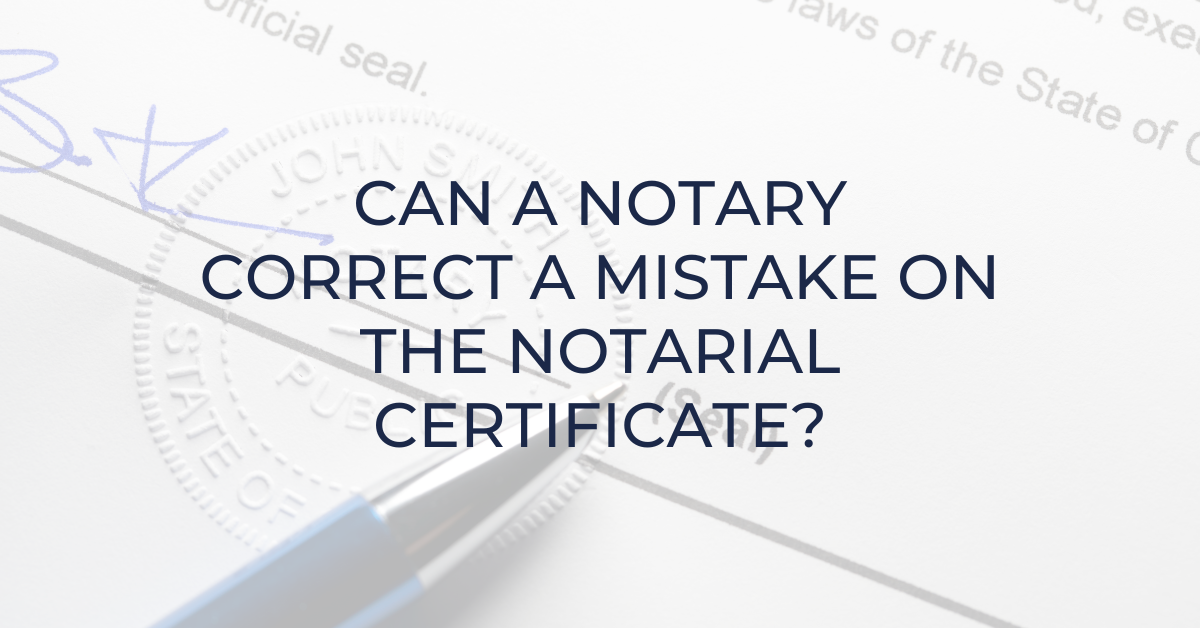Notary Public Underwriters Blog
Can a Notary Correct a Mistake on the Notarial Certificate?
- Details
- Published: February 24, 2025

A notary’s official notarial certificate on a document, containing the facts of the notarization performed and the notary’s official signature and seal, is lasting and visible evidence of the notary’s official act.
Many notaries might assume that only themselves and the people for whom they notarize will ever see a completed notarial certificate on a particular document. But a notarized document can travel far and wide, especially those that are shared business-to-business.
Some notarized documents become evidence in a court proceeding, which means in most cases they are entered into public record. Other notarized documents are held and made available to the general public by a public official who is the designated custodian of those records… for example all the notarized documents that are part of a real estate transaction (land records).
Notaries, with so many possible eyes on any document that you might notarize, isn’t it worth a few extra minutes to pause and scan each notarial certificate you complete, to check for embarrassing (and potentially harmful) errors or omissions you might have made?
Even more challenging is the fact that in most states, a notary cannot correct a notarial certificate after the notarization is completed. At best and depending on a notary’s state law and rules, they can cross-through the certificate containing the error or omission, perform a new notarization, and complete a new, correct notarial certificate.
But it takes only a minute or so to avoid those headaches, by scanning every completed notarial certificate for all required elements, before the document leaves your sight. Review everything in your certificate: the venue (“State of ____, County of _____”); the specific type of notarial act performed and wording reflecting that notarial act; the date of notarization; the name of the person whose signature was notarized; your official signature, title of office (“Notary Public, State of (Your State)”), and finally your official stamp or seal.*
__________
*Not required in every state but strongly recommended.
The point is, of course it is worthwhile to always scan your completed notarial certificates for errors and omissions…! If you don’t want to rely solely on your memory, a very smart practice would be to keep authoritative notary resources handy, either in your briefcase or bookmarked on your laptop, phone, or tablet. Many states’ official notary divisions provide helpful notarization guides and tools on their websites. You can also obtain membership in a notary organization providing help-desk and emailed notary information and tips.
Mistakes happen, so try to have a plan for dealing with them in whatever way your state allows. Also take time on a regular basis to review your notary law and administrative rules, paying special attention to notarial certificate formats and the requirements for performing the related notarial acts.
You can’t always correct a mistake on a notarial certificate, but you can always work hard to avoid making the mistake in the first place.
Related Article(s)
How to Complete a Notarial Certificate
Can I Notarize a Document That Is Already Signed?
What to Do When the Notary Certificate Is Missing?
What Should I Do When There's No Room for My Notary Stamp?
Does a Notary Need to See the Entire Document When Notarizing?
Can a Notary Perform a Single Verbal Ceremony for Multiple Notarizations?
Notary FAQs: Essential Answers for Everyday Scenarios
Can a Notary Notarize a Family Member's Signature?
When Can a Notary Use Personal Knowledge to Identify a Signer?
Can a Notary Change a Document’s Date?
Can I Notarize a Document in a Language I Don’t Understand?
